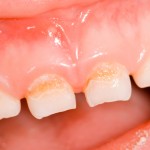
Caries is the most common chronic disease in children and adults and it is costly to manage. Studies have suggested that probiotic bacteria may have a beneficial effect on caries prevalence.
The aim of this study was to evaluate the effect of a probiotic chewing tablet, given as a daily supplement after fluoride toothpaste use, on the development of early childhood caries in preschool children living in a multicultural low-socioeconomic area.
Methods
Healthy Children age 2-3 years of age were randomised to receive either probiotic chewing tablets containing not less than a 1 × 108 total CFU ProBiora3® blend of three strains of probiotic bacteria (S. uberis KJ2TM, S. oralis KJ3TM, S. rattus JH145TM) or placebo tablet. The tablets had a wild cherry flavour and were sweetened with erythritol, a natural low-cariogenic polylol. Compliance was rated as ‘acceptable’ when ≤3 tablets per week were forgotten and as “questionable” when this happened more frequently.
All parents were thoroughly instructed to carry out tooth brushing with a smear layer of fluoridated toothpaste (1,100 ppm) twice a day (morning and evening) throughout the entire study period. Children were clinically examined at baseline and after 1 year by one of two trained and calibrated dental hygienists.
Caries was visually scored on surface level as, sound (no evidence of caries), initial (first visual change in enamel), cavitated (breakdown of enamel, with or without visible dentine) or arrested (hard and smooth surface but whitish, brownish or black) after drying and cleaning and expressed as decayed surfaces (ds). Caries increment was calculated for each patient.
Results
- 138 patients were randomised (71 intervention, 67 placebo)
- 28 patients (20%) were lost to follow up, 17 in intervention group 11 in placebo group.
- Compliance was graded as acceptable in 72 % of the children in the test group and 69 % in the placebo group.
- Mean caries increment (ds) at 1 year was significantly lower in the in test group =0.2 (SD, 1.2) placebo group = 0.18 ( SD, 1.4)
- Absolute risk reduction = 22%
- Relative risk reduction = 0.47 (95% CI; 0.24–0.98)
- Numbers needed to treat = 5
- No adverse effects were reported.
Conclusions
The authors concluded:
Within the limitations of the present study, the results suggested that early childhood caries development could be reduced through daily administration of these probiotic chewing tablets as adjunct to daily use of fluoride toothpaste in preschool children. Therefore, further studies to confirm these findings and clarify a possible dose–response relationship, as well as health economic issues, seems justified.
Comments
This is an interesting trial that suggests that probiotics may be helpful in reducing caries. However as the authors’ note other studies conducted in a range of age groups provide conflicting results. The authors also highlight the challenges they faced in recruitment and the high level of drop out (20%) should be noted. Both recruitment to the study, drop out and compliance could have been related to the potentially challenging treatment regime of a daily pill for children. Additional studies need to be carried out to see if these findings are repeatable if there is a dose-response and the whether the intervention is acceptable and cost effective.
Previously we looked at a systematic review ( Dental Elf 28th April) which suggested that probiotics reduced mutans streptococci counts. While that review included 19 studies only 2 reported caries as an outcome.
Links
Primary paper
Hedayati-Hajikand T, Lundberg U, Eldh C, Twetman S. Effect of probiotic chewing tablets on early childhood caries-a randomized controlled trial. BMC Oral Health. 2015 Sep 24;15(1):112. doi: 10.1186/s12903-015-0096-5. PubMed PMID: 26403472; PubMed Central PMCID: PMC4583156.

Interesting study
#caries prevention with probiotics? https://t.co/oKWSGALzBf
Can probiotic chewing tablets reduce caries in pre-school children? https://t.co/oKWSGALzBf
#Caries: most common chronic disease in children & adults. Could #probiotics help? Small trial suggests perhaps so https://t.co/7cO7RYIYn4
Trial suggests probiotics may reduce caries https://t.co/oKWSGALzBf
Don’t miss Probiotics for caries prevention? https://t.co/oKWSGALzBf